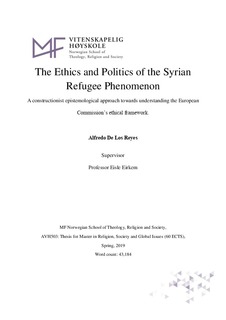| dc.description.abstract | This thesis examines the ethical construct of the European Commission's (EC) socio-political responses regarding the Syrian refugee phenomenon by implementing an inductive qualitative strategy. Utilizing constructionism as my ontological approach, to examine how the EC's social realities came into existence and are influenced, assembled, and maintained in specific social contexts, I set out to answer:
"Which ethical stance(s) has the European Commission taken in its political responses towards the Syrian refugee ‘crisis’?" And "What does their ethical construct reveal about their institution and the refugee phenomenon?"
To help achieve this goal I implement a thematic analysis in which I construct an analytical framework, incorporating the binary continuum of partialism and impartialism, to gage the ethics of political theories and the social constructs they implement to justify the inclusion, exclusion of refugees into their communities and territory. The findings revealed the EC constructs its ethical stances from a universal liberal approach which understands refugees through concepts of human dignity and impartiality while limiting its scope to be particularistic towards its representative population, showing partiality towards its community's shared way of life.
Given the significance of the EC as an influential institution for millions of people, this thesis has contributed to better comprehending some factors that determine how and what influences their institutional ethical decision making which could aid in predicting how future "crisis" are handled. Through examining the work of Matthew Gibney (2004) on impartialism, partialism, and the principles of humanitarianism, this thesis also tests' and develops ethical theories, assisting in bridging the disparities between theory and practice. Additionally, having identified the institutional values of the EC, it contributes to identifying general patterns in liberalism and offers possible solutions which contribute to advancing ethical theory building; mainly through implementing impartial inclusiveness of concepts of the good which could facilitate a paradigm shift in societies that are favorable towards refugees. Lastly, this thesis contributes to the studies of the political and social trends that appear to be on the horizon, mainly the challenge to the current global liberal order of international politics by populism. | nb_NO |
